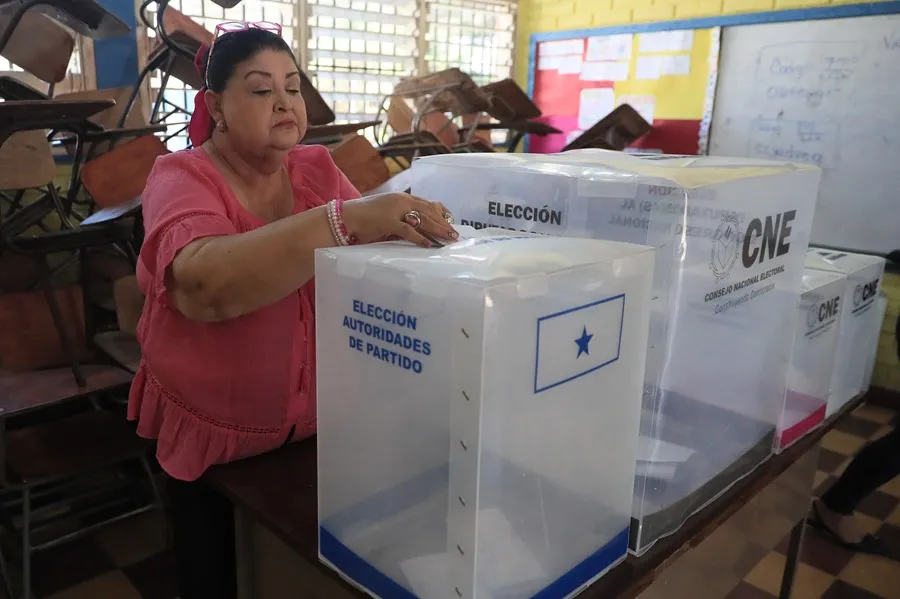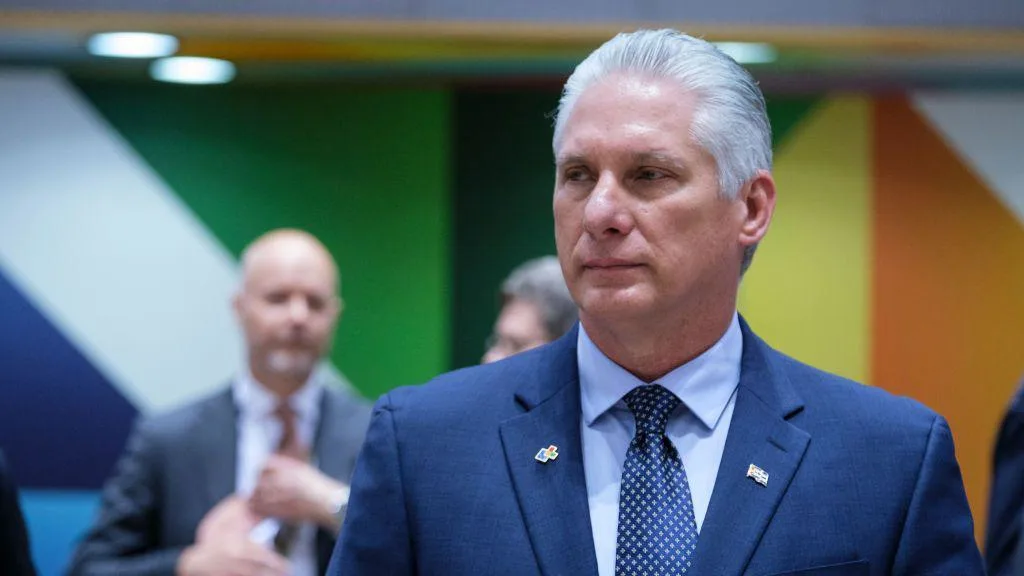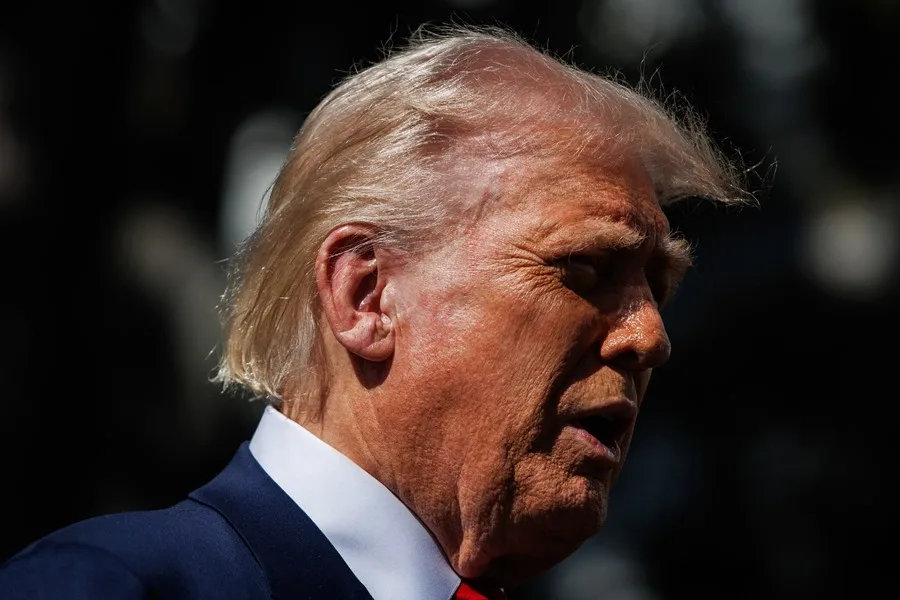International
There is discontent in Honduras over several irregularities in the primary and internal elections

Many Hondurans have expressed their discontent and indignation over several irregularities in the primary and internal elections this Sunday, in which nine hours after the start of the voting the material had not reached the scrutiny centers, mainly in Tegucigalpa.
“They want to steal the elections from the Government, the military is also to blame because they have not fulfilled the mission of correctly distributing the electoral suitcases,” a woman who waited more than three hours to vote at the Republic of Nicaragua School, in the Miraflores neighborhood, in the eastern end of the capital of Honduras, told EFE.
The same woman, who identified herself as a militant of the Liberal Party, second opposition force, said that “it is absurd that the suitcases to this polling center have arrived so late, when the distribution center” of the electoral material “we have it 300 meters away.”
Regarding the recorded incidents, there have been non-coincident statements between the head of the National Electoral Council (CNE), Cossette López, who represents the National Party, the first opposition force, and another of the councilors, Marlon Ochoa, of Libre.
Among the recorded facts is the hiring, at the last minute, of urban transport minibuses, which have circulated through the capital without electoral and military custodians, which has created suspicion among citizens.
López told journalists that some ballot boxes do not appear and that she herself will go looking for them, and that the CNE will investigate why the delay in the distribution of electoral material was due.
In some polling stations, the material had not arrived nine hours after the start of the elections, which were opened at 07:00 local time (13:00 GMT).
“We are not looking for culprits, but solutions” and “do not contribute to misinformation or chaos. We have a report from the Armed Forces and only 24 educational centers remain to open, but those data do not match, ten trucks were exchanged for 90 buses to transport the electoral suitcases, the transport company has failed us,” López said.
Another unusual fact is that state minibuses have appeared full of electoral suitcases.
In the midst of this situation, hundreds of Hondurans went out to different streets of Tegucigalpa to protest the delay in the arrival of the material for the elections.
With flags with the blue and white of Honduras, the demonstrators burned tires in the four lanes of the Armed Forces boulevard, where the transit of vehicles had been interrupted for more than two hours.
“Out of the family” and “We want the polls” were the main slogans of the demonstrators in front of the Toribio Bustillo and Juan Guifarro López schools, in the Las Brisas and Betania neighborhoods, southeast of Tegucigalpa.
“We need the ballot boxes, because we want to vote, they have stolen our votes,” Dimas Hernández, one of the demonstrators, told EFE while holding a flag of the country.
Some of the polling centers in Tegucigalpa opened with two hours of delay, but in others, such as the Toribio Bustillo and Juan Guifarro López schools, until 16:00 local time (22:00 GMT) they had not even received the electoral material, according to EFE.
The demonstrators warned that they will not lift the blockade of the boulevard until the National Electoral Council (CNE) sends the electoral suitcases, which has not allowed more than 1,000 people to exercise their right to vote.
Similar protests were also reported in the Morazán, La Travesía, La Joya and 21 de Octubre neighborhoods, among others.
The head of the CNE said that the people of Honduras have trusted them to develop the electoral process and that is why they were “shating their faces.”
Councilor Marlon Ochoa said that the delay in the delivery of the ballots is partly due to the non-compliance with the schedule of two printers corresponding to the department of Comayagua, center.
“If these printers had delivered on time, we would not have had to suspend the flows of making the electoral suitcase in the electoral logistics center for the office of the Central District (Tegucigalpa) punctually,” he stressed.
In addition, “there is a non-compliance of the transport provider, it was never considered in the specifications that transport in the Central District was going to be carried out by buses” and “in the same way, this change in the conditions with the transport provider was never accepted or communicated with the plenary of councilors,” he added.
“Thirdly, there are or were errors attributable to the National Electoral Council related to the loading and dispatch of electoral material in the Central District,” he said.
According to data from the Network for the Defense of Democracy (RDD), 67% of its observers recorded “delays” in the delivery of electoral material and the opening of the polls, while 33.3% reported logistical problems in the delivery of suitcases.
In addition, 50% of the observers of the GDR denounced “restrictions on the right and duty of electoral observation” by members of the Vote Receiving Board.
The head of the National Party bench, Tomás Zambrano, denounced that Libre “is boycotting” the elections with “the support of a highly ideological sector of the FFAA (Armed Forces).”
“This that Honduras is experiencing is not an accident, it is not a coincidence, it is the Venezuela in action plan, Libre is boycotting the elections with the support of a highly ideological sector of the Armed Forces… the delays in the arrival of electoral material and the opening of the polls had never happened, nothing is a coincidence,” Zambrano emphasized in X.
The National Commissioner for Human Rights in Honduras (Conadeh) asked Hondurans this Sunday to “stay calm and avoid confrontations.”
The human rights agency also called for avoiding the spread of disinformation and denouncing any irregularities.
“These problems generate special concern, since delays and lack of information affect the normal development of the electoral process, reducing public trust and generating uncertainty among the population. The perception of irregularities, misinformation and chaos can affect the transparency of the process and the legitimacy of the results,” Conadeh stressed.
For their part, opposition leaders blamed the Honduran Armed Forces and the Minister of Defense, Rixi Moncada, who is also the presidential pre-candidate of the ruling Freedom and Refoundation (Free) party, for the delay in the primary and internal elections.
The elections, which are prior to the general elections of November 30, began at 07:00 local time (13:00 GMT), but more than five hours later in several polling centers, mainly in Tegucigalpa, the capital, the material had not reached the polling stations, in an unprecedented fact. In other processes there were some delays, but for less time.
The distribution of all the material, by law, has always corresponded to the Armed Forces, whose Chief of the Joint Chiefs of Staff, Roosevelt Hernández, told journalists that the delay has obeyed “part of the experience that is being acquired.”
In addition, he acknowledged that in Tegucigalpa the distribution of electoral material began late, so some centers were arriving five hours later, as part of “the experience” that the military institution is acquiring.
The distribution of all electoral material at the national level, under the responsibility of the Armed Forces, began on March 4.
The allegations against the Minister of Defense are derived because she is also the presidential pre-candidate of Libre, whose party came to power after the triumph in the general elections of November 2021.
Moncada, according to Jorge Cálix, one of the presidential pre-candidates of the Liberal Party, the second opposition force, seeks to discourage voters of the Liberal and National parties, given the little support that she would have in Libre.
The senior military chief reiterated that the delay in the delivery of the material in some polling centers in the Honduran capital “are lessons learned” and that the Armed Forces are a “very professional” institution.
Hernández downplayed the opposition and many voters who blame the Armed Forces and the Minister of Defense, arguing that “it is not what a person can say, or analysts, are the actions and we are in the best disposition,” and that they were “looking for the solution to any unforeseen event.”
The 2025 electoral process in the country is costing Hondurans, with their taxes, 2 billion lempiras (78.4 million dollars), in a country where more than 60% of its ten million inhabitants live in poverty.
The primary and internal elections held in Honduras were extended for four hours in Tegucigalpa and San Pedro Sula, the two most important cities in the country, due to incidents recorded in several polling stations, to which the ballots had not reached.
On national radio and television, the head of the National Electoral Council (CNE), Cossette López, announced that the elections, which are prior to the general elections of November 30, will be extended until 21:00 local time (03:00 GMT) in Tegucigalpa and San Pedro Sula.
He added that in the remaining 296 municipalities of the country the elections ended at 17:00 hours (23:00 GMT), as planned.
López asked the population that had not exercised the suffrage, to go out to exercise that right, despite the incidents, in what constitutes an unprecedented event in the Central American country, although in other processes there were delays, but not so prolonged.
International
Venezuela Debates Broad Amnesty Law Covering 27 Years of Chavismo

Venezuela’s Parliament began debating on Thursday a sweeping amnesty bill that would cover the 27 years of Chavismo in power, while explicitly excluding serious human rights violations and crimes against humanity.
The proposed legislation, titled the “Amnesty Law for Democratic Coexistence,” was introduced by interim President Delcy Rodríguez, who assumed power following the capture of Nicolás Maduro during a U.S. military operation.
The legislative session was convened for Thursday afternoon, with lawmakers holding an initial discussion focused on the general principles of the bill. This phase precedes a consultation process with civil society, after which the proposal will move to a final debate examining each article individually.
According to a draft of the bill obtained by AFP, the amnesty would apply to individuals accused of crimes such as “treason,” “terrorism,” and “incitement to hatred,” charges that were frequently brought against political prisoners over the past decades. The scope also includes offenses ranging from acts of rebellion to punishments imposed for social media posts or messages sent through private messaging services.
The bill’s explanatory text emphasizes reconciliation, stating that it seeks to move away from “vengeance, retaliation, and hatred” in favor of “opening a path toward reconciliation.”
However, the proposal explicitly excludes from its benefits crimes such as “serious human rights violations, crimes against humanity, war crimes, intentional homicide, corruption, and drug trafficking.”
These exclusions, the text notes, are based on strict compliance with the Venezuelan Constitution, which already prohibits granting amnesties or pardons for such offenses.
International
Díaz-Canel Calls for Talks With Washington Without Pressure as U.S. Tightens Oil Sanctions

Cuban President Miguel Díaz-Canel said on Thursday that his government is willing to engage in dialogue with the United States, provided that talks take place on equal terms and without pressure.
“Cuba is prepared to hold a dialogue with the United States on any issue that either side wishes to discuss,” Díaz-Canel said during a press conference broadcast nationwide on radio and television.
He stressed, however, that such dialogue would only be possible “without pressure, without preconditions, on the basis of equality, and with full respect for our sovereignty, independence, and self-determination.” The Cuban leader added that discussions should avoid issues that could be interpreted as interference in the country’s internal affairs.
Díaz-Canel’s remarks come at a time when Cuba is facing growing pressure from the administration of U.S. President Donald Trump, which has implemented a series of measures that have restricted the island’s access to fuel needed to generate electricity.
Washington has sought to prevent Cuba from receiving oil from Venezuela, its main ally for more than two decades, and has stepped up pressure to reduce crude shipments from Mexico. In addition, Trump signed an executive order in late January allowing the United States to impose tariffs on countries that sell oil to Cuba.
In that order, the U.S. president declared that Cuba represents an “unusual and extraordinary threat” to U.S. national security and foreign policy, accusing the island of aligning itself with hostile countries and actors.
International
HRW Warns Trump’s Influence Has Weakened Human Rights in Latin America

Human Rights Watch (HRW) warned that the political influence and rhetoric of U.S. President Donald Trump have contributed to a deterioration of human rights conditions across Latin America and the Caribbean. In its World Report 2026, the organization stated that several governments in the region have committed abuses against migrants and citizens, or have used U.S. policies as justification to impose harsher repressive measures.
During the first year of Trump’s new term, HRW observed that multiple countries violated the rights of foreign nationals under direct pressure from Washington. Other governments deepened security strategies based on militarization, mass detentions and excessive use of force, according to the report.
“The impact of the Trump administration has undoubtedly been negative in Latin America and the Caribbean,” said Juanita Goebertus, HRW’s Americas director. However, she emphasized that “governments in the region remain responsible for defending democracy and fundamental rights, regardless of who is in power in Washington.”
HRW also reported that the United States significantly reduced cooperation funding for human rights organizations and independent media. At the same time, countries such as El Salvador, Peru and Ecuador passed laws allowing the arbitrary closure of civil society organizations and media outlets, weakening democratic systems and institutional checks and balances.
The organization further criticized what it described as a “double standard” in U.S. foreign policy, which condemns human rights violations in Venezuela, Cuba and Nicaragua while overlooking serious abuses committed by allies such as El Salvador, Peru and Ecuador. The report also included criticism of the U.S. military attack against Venezuela in early 2026, warning that it could strengthen Nicolás Maduro’s regime and respond primarily to U.S. political and commercial interests.
-

 International2 days ago
International2 days agoEpstein Denies Being ‘the Devil’ in Newly Released Video Interview
-

 International2 days ago
International2 days agoSpain Seeks to Ban Social Media Access for Children Under 16
-

 International2 days ago
International2 days agoMexico to Send Humanitarian Aid to Cuba Amid U.S. Threats Over Oil Shipments
-

 International2 days ago
International2 days agoPetro Resumes Extraditions, Sends Top Criminal to U.S. Before White House Talks
-

 International2 days ago
International2 days agoHypothermia Linked to Most Deaths During New York’s Recent Cold Spell
-

 International2 days ago
International2 days agoMexico Arrests Suspect in Shooting of Sinaloa Lawmakers
-

 International1 day ago
International1 day agoDelcy Rodríguez Takes Control of Chavismo as Venezuela Enters a U.S.-Supervised Transition
-

 International1 day ago
International1 day agoHRW Warns Trump’s Influence Has Weakened Human Rights in Latin America
-

 Central America4 days ago
Central America4 days agoCosta Rica Goes to the Polls as Voters Choose Continuity or Change
-

 Central America2 days ago
Central America2 days agoLaura Fernández Says She Will ‘Never’ Allow Authoritarianism in Costa Rica
-

 International2 days ago
International2 days agoNFL Investigating Emails Linking Giants Executive to Jeffrey Epstein
-

 International6 hours ago
International6 hours agoVenezuela Debates Broad Amnesty Law Covering 27 Years of Chavismo
-

 International6 hours ago
International6 hours agoDíaz-Canel Calls for Talks With Washington Without Pressure as U.S. Tightens Oil Sanctions
-

 Central America6 hours ago
Central America6 hours agoPanama Will Not Be Threatened, President Says Amid Rising Tensions With China
-

 Central America6 hours ago
Central America6 hours agoBukele’s Approval Rating Climbs to 91.9% in El Salvador, Survey Shows


























